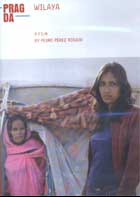
Wilaya 2012
Distributed by Pragda, 302 Bedford Ave., #136, Brooklyn, NY 11249
Producer n/a
Directed by Pedro Pérez Rosado
DVD, color, 97 min., Spanish and Arabic with English subtitles
High School - General Adult
Drama, Family, Feminism, Human Rights, Indigenous Peoples, Muslims, Postcolonialism, Poverty
Date Entered: 03/10/2016
Reviewed by Linda Frederiksen, Washington State University, Vancouver, WATindouf Province in western Algeria has a complicated history. Bordered by Morocco, Mauritania, and the disputed territory of Western Sahara, the area includes a collection of large refugee camps that came into being when Spain abandoned the area in 1975. The unsettled political status of the indigenous Sahrawi people who inhabit the camps has not changed in more than 40 years. While some of the Sahrawi immigrate to Spain for school or employment, most remain in one of the harsh desert towns (or wilayas), where they live as a people without a country. This seemingly permanent temporary aspect affects every aspect of life.
As the film begins, Fatimetu, who has spent more than a decade in Spain, returns to her home and disabled sister in one of the refugee camps. Her Western clothing and feminist attitude quickly draw the attention and interest, though not the ire, of the conservative Muslim community in which she finds herself. While she appears to have lingering emotional ties to Spain, she soon becomes immersed in her surroundings. She buys a car, starts a small delivery business, teaches her sister to drive, attends local ceremonies and becomes involved in the daily lives of her neighbors and relatives.
Actress Nadhira Mohamed convincingly portrays a young person caught between two worlds. Made on location in Tindouf province, and including a unique original music score, Wilaya is a notable example of emerging independent international cinema.